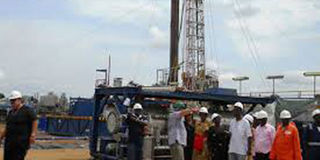Why Uganda’s oil may become curse

The discovery of large oil reserves in Uganda in 2006 led to high expectations that the economy would quickly be transformed. It is undeniable that oil fuels the global economy and due to the enormous financial resources that can accrue from this industry, oil discovery in the country was greeted with great optimism.
However, a World Development Report of the United Nations Conference on Trade and Development states that extractive activities, including oil exploration, have profound social and environmental impacts. It is clear that the discovery of Uganda’s oil has created a sense of hope and expectations like employment opportunities to local communities and revenue, which can lead to the development of communities. However, in most cases, such dreams remain illusory as the exploration of oil leads to the destruction of local communities and anarchy in oil-producing developing countries.
It is a fact that oil activities pose challenges on the environment and livelihoods of the people. For instance, resettlements jeopardise livelihoods of people, put undue strain on them and their families as they struggle to develop alternative livelihood practices to fend for their already cash-strapped families and health risks, which become acute in communities living near exploration areas.
A report by the US Non-Governmental Delegation that visited the Niger Delta indicated that in the local communities there, respiratory diseases, skin rashes, cough blood, tumors, gastrointestinal problems, different cancers and malnourishment were common. In addition to the health risk for the local communities from environmental pollution and accidents because of oil explorations, influx of migrant populations brings health problems to host population through the introduction of new diseases. And also according to research, women living in communities near oil fields are at a 2.5 higher risk of spontaneous abortion.
The environmental pollution associated with oil activities also has serious implications for the survival of species in communities near oil reserves. Oil activities result in destruction of livelihoods making it difficult for present and future generations to make a living off their land. It is noted that Uganda’s oil projects are located in both lakes and national parks, which threaten fisheries, tourism, bird life and ecological water life.
The government should know that Uganda’s top foreign earner is tourism and if oil activities are exploited in the lakes and national parks, the country is more likely not only to lose resources from the tourism, but also affect the communities that depend on those natural resources.
Patrick Edema,
[email protected]


